Former players
Goalkeepers
- Fabrice Catherine
- Aurélien Hérisson
- Andreas Isaksson
- Patrice Luzi
- Florent Petit
- Simon Pouplin
- Christophe Revault
Defenders
- Lucien Aubey
- Adailton
- Carlos Bocanegra
- Guillaume Borne
- Grégory Bourillon
- Amadou Coulibaly
- Elderson Uwa Echiejile
- Erik Edman
- Rod Fanni
- Jacques Faty
- Petter Hansson
- Maxime Le Marchand
- Gilbert Manier
- John Mensah
- Mario Melchiot
- Prince Oniangue
- Abdeslam Ouaddou
- Jean-Joël Perrier-Doumbé
- Yoann Pivaty
- Alain Rochat
- Laszlo Sepsi
- Arthur Sorin
- Djimi Traoré
Midfielders
- Cédric Barbosa
- Bruno Cheyrou
- Étienne Didot
- Papakouli Diop
- Yoann Gourcuff
- Junichi Inamoto
- Cyril Jeunechamp
- Kim Källström
- Felix Katongo
- Stéphane Mbia
- Arnold Mvuemba
- Jimmy Nirlo
- Olivier Sorlin
Forwards
- Ismaël Bangoura
- Jimmy Briand
- Emerson
- Julian Esteban
- Alexander Frei
- Asamoah Gyan
- Youssouf Hadji
- Yohann Lasimant
- Damien Le Tallec
- Hicham M’Laab
- Olivier Monterrubio
- Benjamin Moukandjo
- Daniel Moreira
- Stéphane N’Guéma
- Mickaël Pagis
- Moussa Sow
- Olivier Thomert
- John Utaka
- Sylvain Wiltord
Staff technique
- André Amitrano
- Laszlo Bölöni
- Landry Chauvin
- Guy Lacombe
- Christophe Lollichon
- Alain Ravera
- Philippe Redon
- Joaquim Rolao Preto
- Christian Schmidt
- Michel Sorin
Derniers articles de la rubrique
After doing his first professional steps in the era of Christian Gourcuff, the Paimpolais became quickly a key player in Rennes’ midfield. U23 French International player and symbol of Brittany identity for the club, Étienne Didot grew to be an essential player in the squad, becoming the team captain after Olivier Monterrubio’s transfer to Lens. After rumours of transfer during the 2007 summer, Étienne Didot finally prolonged his contract by two more years. The Costarmoricain had to bear a difficult 2007-2008 season, with multiple injuries and the lack of confidence of Guy Lacombe in him who regularly made him play with the reserve team at the end of the season. After spending most of his career with Rennes, he finally left the club to play for Toulouse in June 2008.
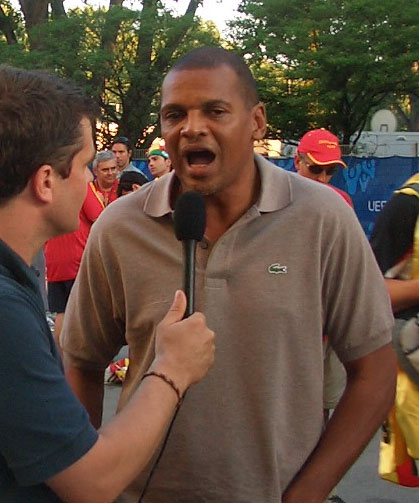
Born in Guyana, Bernard Lama turned professional in Lille. A Very agile goalkeeper, he took his time before standing out with the professionals, but he finally came to light with Paris Saint-Germain. He then becomes the goalkeeper of “Les Bleus” and won many titles with the national team, especially the titles of World and European champion. In summer 2000, as he was nearing the end of his career, he was recruited by Stade Rennes, where he was reunited with his former team mate Paul Le Guen, now the coach of the Breton team. In the Rennes’ goal, he immediately brought all his experience, but the content of the season was disturbed by off-pitch issues. Lama was in conflict with Rennes’ management when they decided to dismiss Le Guen. Lama logically left the club at the end of his contract, in summer 2001 and retired from the pitches. Since, the former goalkeeper has remained in the footballing world. In 2006, he was named as the national coach of Kenya for a very short period.
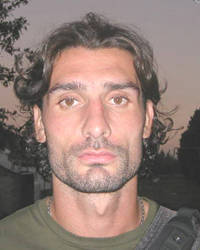
An Argentinian defender, Gabriel Loeschbor started his career with Rosario Central in 1997. After a short period with the famous Racing where he wins the opening tournament of the Argentinian championship, he was recruited by Stade Rennais in 2002 and travelled to Europe. His time in brittany would prove catastrophic. Loeschbor appeared extremely slow during his first games. During the fourth game, on july 24th 2002 against Marseille he was sent off in what would be his last game with the first team. Loeschbor remained on the substitute bench or with the reserve squad for the rest of the season. Transferred to Murcia one year later, he didn't find success there either, he finally returned to Argentina after a short time in the mexican league.
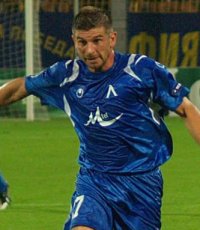
Trained at Olympique lyonnais, Cédric Bardon discovered Division 1 there at 18. He gradually became a regular player in the first squad but never proved a great striker. In 1998 he joined Stade Rennais where he remained for three seasons. He managed two correct seasons initially, but suffered of the comparison with the outstanding Shabani Nonda, whom he regularly supported in attack. He spent most of the 2000-2001 season on the substitute's bench, after which he left the club and continued his career in Guingamp and in Le Havre, then abroad. Bardon discovered the Champion's League with the Levski Sofia and Anorthosis Famagusta. In june 2010 he cameback in France with Fréjus (National), where he eventually ended his career a year later.
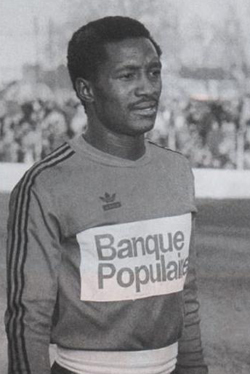
Laurent Pokou is one of the best, maybe even the best player who ever played for Stade Rennes. He started his career in his country, Ivory Coast, with ASEC Abidjan and then USFRAN Bouaké. Back to ASEC, he built up a national reputation by winning many titles, and an international reputation with the “Elephants”. The Best scorer of the 1968 and 1970 ACNs, he scored fourteen goals during these two editions, a record that stood for nearly forty years. In 1972, he took part to a « Mini World Cup » in Brazil, where he was showered with praise by Pelé. Logically courted by prestigious French clubs, Pokou left Ivory Coast in December 1973, only. Already 27 years old, he signed with Stade Rennes, thanks to an intervention of François Pinault and his network of acquaintances. The Breton public immediately fell in love with this disconcerting striker, capable of improbable exploits. The team revived thanks to this reinforcement: moribund in D1 until then, Rennes avoided relegation a first time. However, despite Pokou’s contribution (15 goals in 1974-1975), Rennes couldn’t avoid the drop to D2 next year. Encouraged to leave Rennes by the Ivorian press, Laurent Pokou finally decided to stay. The beginning of his season was astonishing, with seventeen goals scored in eleven matches. Unfortunately, during a game at Châteauroux, his season was stopped prematurely, because of a major knee injury. Pokou would not play again for seventeen months. Victim of serious financial troubles, and once again relegated in 1977, Stade Rennes had to let go its Ivorian pearl. Pokou was transferred to Nancy, where he played alongside a young Michel Platini. The forward would never achieve to play at his best, because of a virus. In September 1978, he decided to come back to Brittany, in the « club of his life », Stade Rennes. This come back only lasted few months, unfortunately. At the end of December 1978, he shoved a referee during a French Cup match at Saint-Pol-de-Léon, and received a two-year ban (a sentence reduced to six months after appeal). Sickened, he came back to Ivory Coast, where he ended his career with ASEC Abidjan. He then started a short coaching career, invested on textile industry, and then managed a few clubs. He then became part of the Ivorian federation and an ambassador for the FIFA.
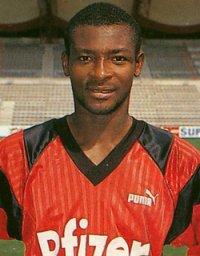
François Omam-Biyik is considered as one the best Cameroonian football players ever. After his professional start with Canon de Yaoundé, he came to France and Stade Lavallois in 1987. He managed three good seasons there, before realising an outstanding 1990 World Cup, where he scored the first goal against Argentina. Recruited by Stade Rennes before the competition, he made an excellent start by scoring the two victorious goals against PSG, including a lovely header (2-1). Excellent in the air, he carried on the tradition of great African strikers in Rennes, initiated, among others, by Laurent Pokou. In a Rennes’ team in difficult position, he realized an excellent 1990-1991 season, with 14 goals, mainly scored at home. His career continued in Cannes, briefly in Marseille, and mainly at RC Lens, where he stayed for three years. After an experience in Mexico, he briefly played in Italy and ended his career in Châteauroux. Taking responsibilities at the Cameroonian federation, he became the assistant to the national coach in August 2010.
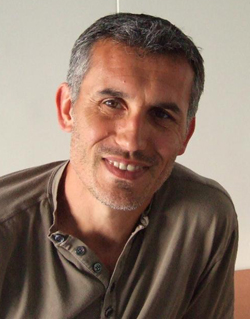
Stéphane Grégoire is an atypical player. After years playing for Thouars, his place of birth, he became professional at 29 when he signed for Stade Rennais. Unexpectedly, the midfielder became an important part in both the starting elevens of Guy David, and Paul Le Guen the following season. Unmovable for three seasons, and having become the captain of Stade Rennais, his playing time was reduced during his last two seasons with Rennes. In 2002, he left the club to spend another two years in Ligue 1 with Ajaccio and then three years in Ligue 2 with Dijon. In 2007, aged 39, he started his reconversion as a manager by taking the reins at Orléans, in CFA.
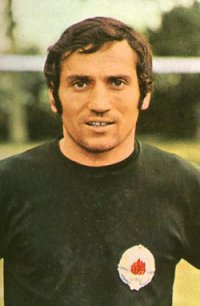
Marcel Aubour is one of the best goalkeepers in France’s football history. After becoming professional in Lyon at the beginning of the 1960’s, he played his first matches in Division 1 there in 1962, before being called with the French national team in 1964. With « les Bleus », he played in the 1966 World Cup, under the management of former Rennais Henri Guérin. During this year 1966, he left Lyon – where he won his first title, the 1964 French Cup – for Nice, returning to his region of birth, the Côte d’Azur. During the winter 1969-1970, Aubour the Provençal with his singing accent, arrived in Brittany. While Nice was trying to get rid of him, the « Red and Black » defence was put to the sword in the league, and Gérard Le Fillâtre, the current goalkeeper, conceding goal after goal. In exchange of Aubour’s transfer and a nice little sum, Le Fillâtre was loaned to Nice. The deal would not be regretted by Stade Rennes. Aubour immediately stabilized the Breton defence and was quickly adopted by the public. The next season, he triumphed in the second Coupe de France victory for Rennes. During the semi-final, he made the difference against Marseille, sickening the opposite players during the penalties shoot-out session. In final, Aubour had less work to do, but he couldn’t help making the public laugh, playing petanque with artichokes thrown on the ground. The Provençal finally left Brittany in 1972, but he had found a second home there. He signed with Reims, where he ended his professional career, at the age of 37. He then came back to Saint-Tropez, where he took over his father’s hotel and where he still lives, enjoying his retreat.
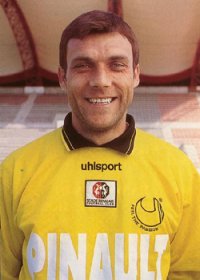
In 1995, as Stade Rennes was looking for a new goalkeeper for its professional team in order to replace Pascal Rousseau and to make up for the failed experiment with Gilles Rousset, the club chose an experienced goalkeeper, Goran Pandurović, who already had a ten years career behind him in Yugoslavian championship, where he won two national titles with Partizan Belgrade. Yugoslavian international, Pandurović played in Rennes for two seasons, before leaving his place to young keeper Tony Heurtebis 1997-1998. Aged 35 years, he then ended his career and became a goalkeepers coach. He worked back in his country of birth, especially with the national squad, before being integrated to the Partizan’s staff in 2007.
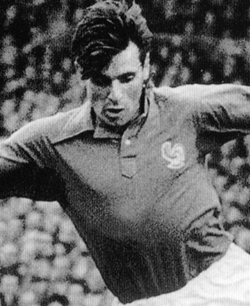
During his youth, Jean Grumellon intended himself for the sea, instead of football. A student at the naval and mechanical school of Lorient, he only debuted in football in 1937, at the age of fourteen, at his home in Saint-Servan. During the war, Grumellon took to the sea with friends. Escaping from the Vichy government, he travelled the Atlantic Ocean and joined the free French army in order to serve his country. In 1945, Grumellon returned home and took up football again. He was quickly noticed by Stade Rennes, where he signed a contract from 1st January 1947. After having played quite anonymously with an amateur team, until the time his contract was validated, he joined the first team for the 1947-1948 season. His skills as an explosive striker were obvious to all, andd Grumellon imposed himself as one of the best forwards Stade Rennes has ever known. Endowed of a relatively weak right foot, he however had an excellent kick with his left foot, which made his reputation. For his first season, even though he was positioned on the left wing, he scored no less than 31 goals! The beginning of a long collection... As seasons went by, Grumellon expressed his skills in attack and joined the French national team. With five goals in ten caps between 1949 and 1952, Grumellon realised a respectable international career, but missed the opportunity to become the hero in one the biggest achievement of « Les Bleus » history: on 3rd October 1951, at Highbury, he missed the chance to offer France its first victory against its “best enemy”, England. At the end of the match, he had two major opportunities to score the winning goal. His first shot ended on the goal-post and he kicked the ground instead of the ball in the second. Recovering fast, he was crowned the best goal scorer of the league in 1950 and therefore succeeded to German Walter Kaiser, author of the same performance a few years before with Stade Rennais. In 1952, finally, Grumellon tried a move away from his native Brittany. A two years’ experience proving inconclusive: he only spent six months in Nice, before playing with Monaco, then in D2. After having played in 1953-1954 with Le Havre, where he found his cutting-edge again, he returned to Rennes in 1954. During his absence, Stade Rennes was relegated in D2 however. Grumellon, already 31 years old (because of the war, he started his professional career only at 24), was not as brilliant as before, but still managed to score thirty goals in two seasons. In 1956, he ended his professional career in order to play in his home town, with US Saint-Malo. He also managed a sport store in Rennes, before coming back for good in the Cite Corsaire. Jean Grumellon died there at the end of 1991, at the age of 68. He remains the best goal scorer in the club’s history, with 154 goals.